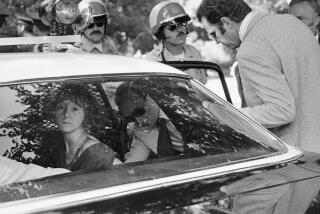Thomas MacBride; Judge in Cultist’s Trial
- Share via
U.S. District Judge Thomas J. MacBride, who presided over the trial of Manson Family cultist Lynette “Squeaky” Fromme, has died.
MacBride was 85 and died of pneumonia Thursday in Sacramento.
During his two decades on the federal bench, MacBride was most widely known for his handling of the 1976 trial of Fromme, the first woman in American history to be convicted of attempting to assassinate a president.
During the trial, he ordered the historic videotaped testimony of President Gerald Ford. Ford was the fifth president in history to testify in a criminal trial but the first to do so by videotape.
Fromme was accused of pointing a loaded .45-caliber handgun at Ford on Sept. 5, 1975, when he was walking through Sacramento’s Capitol Park to shake hands with well-wishers. She was knocked to the ground by a Secret Service agent and the pistol was wrenched from her hand.
Her trial in late 1976 attracted media from around the world and presented MacBride with some unusual decisions.
Before the jury was impaneled, he ordered a temporary ban on the screening of a film about Charles Manson, saying that it was “extremely prejudicial” toward Fromme. The American Civil Liberties Union protested the ban, arguing that it would severely hinder free speech and press rights under the 1st Amendment.
Ford’s testimony was requested by one of Fromme’s attorneys. In issuing the subpoena for the president, MacBride said that Ford did not have to appear in court. But he declared that the president should undergo direct questioning by defense and prosecution attorneys because he was “probably the most percipient witness. He’s the man who looked down the barrel of the gun.”
MacBride traveled to Washington 11 days later to supervise the taping of the testimony, which took 19 minutes. Previously, only four sitting presidents--Thomas Jefferson, James Monroe, Ulysses S. Grant and Richard Nixon--had submitted documents or given written testimony in a criminal case.
The trial was marked by frequent outbursts from the then-26-year-old Fromme, who carved an “X” on her forehead and was among Manson’s most devoted supporters when he was tried in 1970 for the Tate-LaBianca murders in Los Angeles. The most dramatic incident came at her sentencing Dec. 17, 1975, when U.S. Atty. Dwayne Keyes was in the midst of asking MacBride to hand down the most severe punishment.
“She still has shown herself to have feelings of hatred,” Keyes said. At that point, Fromme removed an apple from under a red cloak she had carried into the courtroom and hurled it at Keyes. It smashed on his right temple, knocked off his glasses and broke into pieces. Spectators were aghast and the court went silent.
MacBride asked Fromme if she had any more apples in her bag. “No, that one was for you,” she told the judge, to which he replied, “That was what I was afraid of.”
Wiping off his head, Keyes continued with his statement, saying that Fromme “has reached a point, Your Honor, where rehabilitation may be out of reach.”
Moments later, MacBride sentenced Fromme to life imprisonment.
The veteran jurist “brought a lot of dignity to this court. He also brought a sense of humor to the bench,” said Chief U.S. District Judge William B. Shubb. While not MacBride’s most demanding case, the Fromme trial was challenging in that he had to “maintain the respect of the court without letting the court become her playground . . . for expressing her views. He did that admirably,” Shubb said.
MacBride was a member of the state Assembly for five years and was active in Democratic politics as Sacramento County chairman of John F. Kennedy’s presidential campaign before Kennedy appointed him to the bench in 1961.
He later became the chief judge of the 34-judge Eastern District of California. In 1979, he was transferred to senior status, a form of semi-retirement, and three years ago he retired completely.
He is survived by his wife, Martha, a brother, four children and two grandchildren.
More to Read
Sign up for Essential California
The most important California stories and recommendations in your inbox every morning.
You may occasionally receive promotional content from the Los Angeles Times.














